Rachel Borwein’s every line and movement in ‘Cat on the Hot Tin Roof’ demands and draws audience’s attention
 The Studio Players is performing Tennessee Williams’ through March 1. Cast in the role of the cat is Rachel Borwein.
The Studio Players is performing Tennessee Williams’ through March 1. Cast in the role of the cat is Rachel Borwein.
In the context of the story, the cat’s actual name is Maggie Pollitt. She’s the winsome wife of a sports commentator and former athlete by the name of Brick. Brick is the youngest of two sons of a authoritarian plantation owner, appropriately nicknamed Big Daddy, who is fabulously wealthy. In addition to  sitting on 28,000 acres of the most fertile land in the Mississippi delta, he boasts a portfolio worth $10 million in cash and blue chip stocks. And a recent health scare is now motivating Big Daddy to decide whether to leave the bulk of his estate to Brick or his older son, Gooper, a scheming lawyer motivated as much by sibling rivalry as primogeniture to assume control of the family assets once his father has passed.
sitting on 28,000 acres of the most fertile land in the Mississippi delta, he boasts a portfolio worth $10 million in cash and blue chip stocks. And a recent health scare is now motivating Big Daddy to decide whether to leave the bulk of his estate to Brick or his older son, Gooper, a scheming lawyer motivated as much by sibling rivalry as primogeniture to assume control of the family assets once his father has passed.
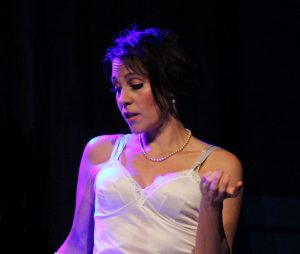 Borwein’s portrayal of Maggie is as nuanced as it is powerful. The role requires her to exhibit an array of complex, often incongruous, emotions ranging from anxiety, longing and loneliness (“living with someone you love can be lonelier than living entirely alone”) to tenacity, dogged determination, contempt, dislike, solidarity and love … all while displaying a pervasive sense of the nervousness of the proverbial cat on a hot tin roof. Borwein doesn’t just check off the requisite sentiments, she mixes, mingles and blends them
Borwein’s portrayal of Maggie is as nuanced as it is powerful. The role requires her to exhibit an array of complex, often incongruous, emotions ranging from anxiety, longing and loneliness (“living with someone you love can be lonelier than living entirely alone”) to tenacity, dogged determination, contempt, dislike, solidarity and love … all while displaying a pervasive sense of the nervousness of the proverbial cat on a hot tin roof. Borwein doesn’t just check off the requisite sentiments, she mixes, mingles and blends them 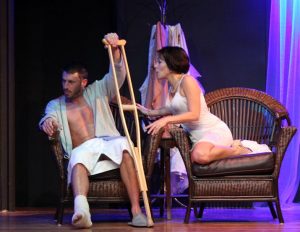 with an amazing degree of subtlety, equanimity and a healthy dose of Southern charm.
with an amazing degree of subtlety, equanimity and a healthy dose of Southern charm.
And yet Borwein and Director Michael Scanlan make it clear that Maggie is no saint. She’s as devious, manipulative and controlling as her father-in-law – which makes sense since they are both motivated to a large degree by their dirt-poor origins. 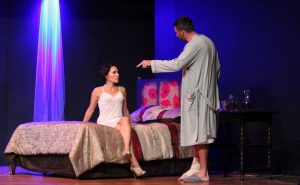 It would have been easy for Borwein and Director Michael Scanlan to attribute all Maggie’s machinations to her unrelenting drive to secure her own financial future. But Borwein’s masterful performance makes it clear that she really does love her husband in spite of his emotional unavailability and alcoholism and her entrenched belief that he
It would have been easy for Borwein and Director Michael Scanlan to attribute all Maggie’s machinations to her unrelenting drive to secure her own financial future. But Borwein’s masterful performance makes it clear that she really does love her husband in spite of his emotional unavailability and alcoholism and her entrenched belief that he 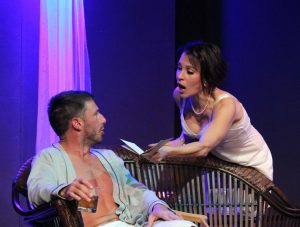 married her strictly for appearances. And while the security that would come from inheriting Big Daddy’s sizable estate is undeniably a motivating factor, she genuinely wishes to spare Brick the grief and regret he’s certain to feel if he fails to patch up his strained relationship with his father before time runs out on them both. On top of that, there’s no love lost between Brick and his brother or Maggie and Gooper’s doting wife Mae.
married her strictly for appearances. And while the security that would come from inheriting Big Daddy’s sizable estate is undeniably a motivating factor, she genuinely wishes to spare Brick the grief and regret he’s certain to feel if he fails to patch up his strained relationship with his father before time runs out on them both. On top of that, there’s no love lost between Brick and his brother or Maggie and Gooper’s doting wife Mae.
Borwein’s 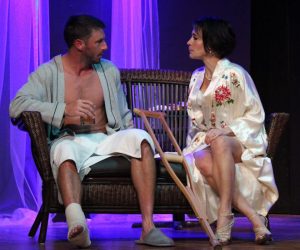 bearing and on-stage demeanor in her scenes with Big Daddy also make it clear that Maggie loves, respects and understands her father-in-law. In fact, she’s more his alter ego than are either of his estranged sons.
bearing and on-stage demeanor in her scenes with Big Daddy also make it clear that Maggie loves, respects and understands her father-in-law. In fact, she’s more his alter ego than are either of his estranged sons.
What’s also apparent from Borwein’s portrayal of Maggie the cat is that her love of money (that is, removal from poverty) is not separate and distinct from the love she feels for Brick and Big Daddy. One doesn’t supersede the other. Rather,  they’re inextricably entwined, which leads to the inescapable conclusion that the outcome of their marital discord might yield a much different outcome were Big Daddy to disown (and thereby impoverish) his youngest son.
they’re inextricably entwined, which leads to the inescapable conclusion that the outcome of their marital discord might yield a much different outcome were Big Daddy to disown (and thereby impoverish) his youngest son.
From that realization emerges yet another dynamic from Borwein/Scanlan’s enlightened portrayal of this iconic 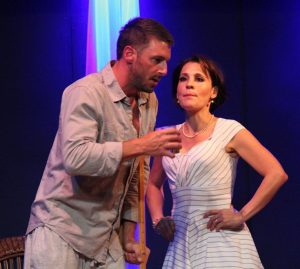 character. Maggie’s father was so “in love with his liquor” that he left her and her mom with neither emotional nor financial support. Maggie is bound and determined not to repeat her mother’s experience and mistake. So it’s not that she’s a little money-grubbing gold digger out to ensure that she gets a piece of Big Daddy’s estate. Rather, she’s driven by the desperate desire to break the chain of familial poverty, neglect and abandonment. But to her chagrin, vexation and growing
character. Maggie’s father was so “in love with his liquor” that he left her and her mom with neither emotional nor financial support. Maggie is bound and determined not to repeat her mother’s experience and mistake. So it’s not that she’s a little money-grubbing gold digger out to ensure that she gets a piece of Big Daddy’s estate. Rather, she’s driven by the desperate desire to break the chain of familial poverty, neglect and abandonment. But to her chagrin, vexation and growing 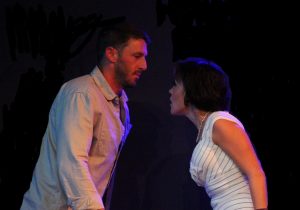 concern and anxiety, Brick is looking more and more like her daddy rather than his antithesis. And that compels her to fight even harder to regain her husband’s affections, restore his relationship with Big Daddy and motivate him to give up the bottle.
concern and anxiety, Brick is looking more and more like her daddy rather than his antithesis. And that compels her to fight even harder to regain her husband’s affections, restore his relationship with Big Daddy and motivate him to give up the bottle.
Even though Brick may not love her, she is “determined to win” and to secure that result, manipulation, jealousy, 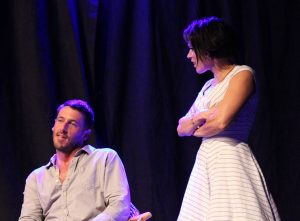 extortion and lying are all fair game. She thinks (rightly or wrongly) that getting pregnant and having a baby might be the solution to all of her problems.
extortion and lying are all fair game. She thinks (rightly or wrongly) that getting pregnant and having a baby might be the solution to all of her problems.
Maggie Pollitt is simply one of the most captivating figures in theatrical history, and seeing her in action is reason enough to catch this play before it closes on March 1. But Borwein’s command of her character’s backstory, mental make-up, 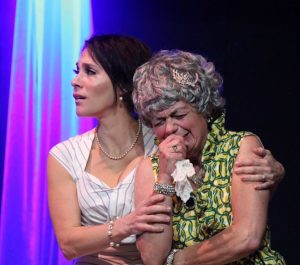 motivations and fears warrant seeing this production even more. She’s a force on stage. Her every line and movement draws and demands your attention. You miss and wait for her return during her absences.
motivations and fears warrant seeing this production even more. She’s a force on stage. Her every line and movement draws and demands your attention. You miss and wait for her return during her absences.
The Studio Players perform in the Joan Jenks Auditorium at Golden Gate Community Center. Follow the links below for remaining play dates, times and ticket information.
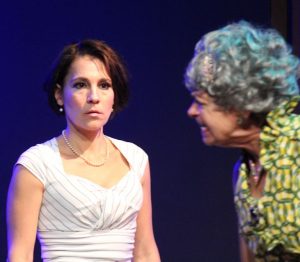 February 14, 2020.
February 14, 2020.
RELATED POSTS.
- ‘Cat on a Hot Tin Roof’ play dates, times and ticket info
- Studio Players producing Pulitzer-winning ‘Cat on a Hot Tin Roof’
- Spotlight on ‘Hot Tin Roof’ actor Danielle Channell














 Tom Hall is both an amateur artist and aspiring novelist who writes art quest thrillers. He is in the final stages of completing his debut novel titled "Art Detective," a story that fictionalizes the discovery of the fabled billion-dollar Impressionist collection of Parisian art dealer Josse Bernheim-Jeune, thought by many to have perished during World War II when the collection's hiding place, Castle de Rastignac in southern France, was destroyed by the Wehrmacht in reprisal for attacks made by members of the Resistance operating in the area. A former tax attorney, Tom holds a bachelor's degree as well as both a juris doctorate and masters of laws in taxation from the University of Florida. Tom lives in Estero, Florida with his fiancee, Connie, and their four cats.
Tom Hall is both an amateur artist and aspiring novelist who writes art quest thrillers. He is in the final stages of completing his debut novel titled "Art Detective," a story that fictionalizes the discovery of the fabled billion-dollar Impressionist collection of Parisian art dealer Josse Bernheim-Jeune, thought by many to have perished during World War II when the collection's hiding place, Castle de Rastignac in southern France, was destroyed by the Wehrmacht in reprisal for attacks made by members of the Resistance operating in the area. A former tax attorney, Tom holds a bachelor's degree as well as both a juris doctorate and masters of laws in taxation from the University of Florida. Tom lives in Estero, Florida with his fiancee, Connie, and their four cats.